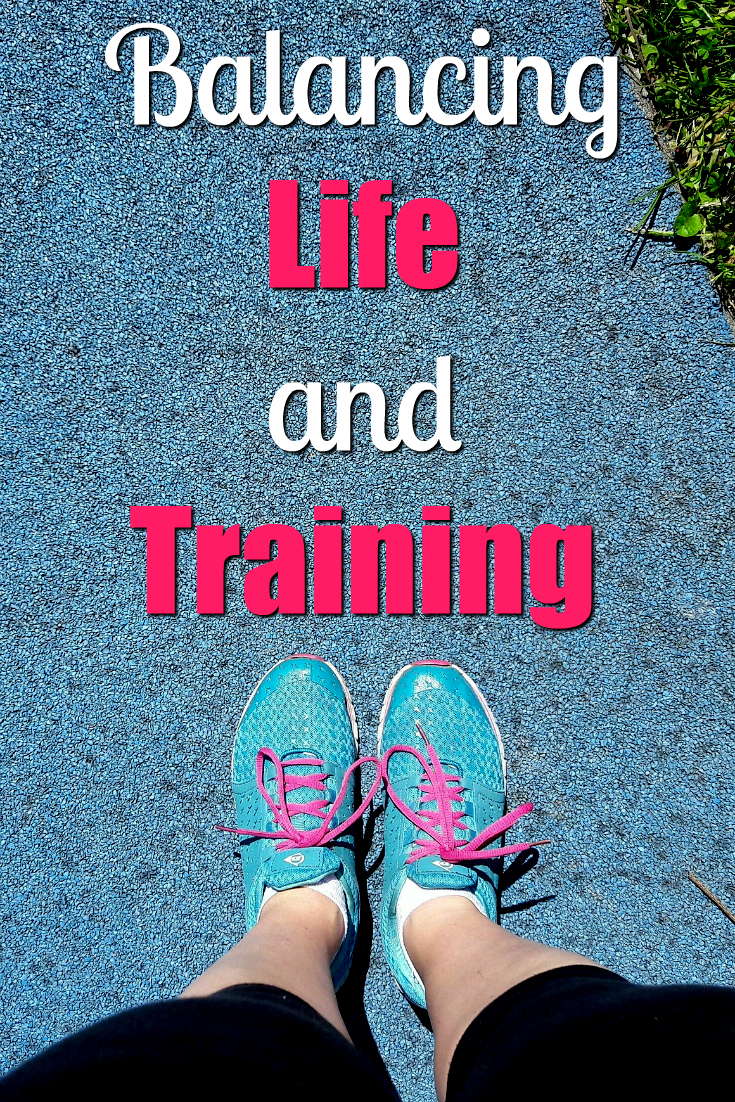Happy Thursday, everyone! Yesterday was Day 11 of Vlogtober and seeing as how many of us … myself included … are gearing up for big races such as the Dopey Challenge, I chatted about balancing life and training … although not in the way you think.
It certainly wasn’t in the way I originally thought.
Now, when it comes to blogging and making videos, I often pick topics about things I’m struggling with. That way, not only can I help you but I’m also helping myself. This if definitely the case when it comes to balancing life and training.

I’ve always struggled with balancing my crazy life. If I’m on top of things at work, then my writing might suffer or my house is a total dump. If I’m kicking butt with a manuscript or knocking out content for Joyful Miles, then my health might suffer because I’m taking crappy care of myself. If I’m a fitness machine, making healthy meals and working out regularly, then my office work might suffer, thus continuing the cycle of my unbalanced life.
And then you throw in marathon training?
Yeah. We’re talking serious spin cycle here.
So this is a topic I’ve wanted to hit on for a long time. Up until a couple weeks ago, however, I thought I’d be offering tips that have more to do with habits and time management such as:
- Waking early to get your runs in
- Reworking your training schedule to better fit your life
- Incorporating family in your cross training
Don’t get me wrong. These great tips can help you get the job done and if that’s what you’re here for, I will be sharing them later on. But this post isn’t just about getting the job done. It’s about finding balance and I gotta tell you. When I followed those tips alone, yes, I did eventually cross the finish line, but they did little to help me feel balanced. Instead, I often felt stressed.
Something was still missing so I worried about taking on this topic.
I mean, who in the world am I to give life balancing tips? Especially considering my state of mind over the summer. If you saw my latest training update video, you’d know that I wasn’t exactly doing a good job of managing my stress. So in September, I took a breather and went back to the daily ritual of Morning Pages, something that has brought me a lot of relief in the past.
Morning Pages is a journaling technique introduced by Julia Cameron in The Artist’s Way (affiliate link) where you write three pages in a journal or spiral notebook, purging all the crazy thoughts that are bouncing around in your head by getting them down on paper. (For more info and a video by Julia, check out this post.)
Still, I didn’t quite know what approach to take with the video until I listened to a Beyond the To Do List Podcast episode in late September. Brooke McAlary of The Slow Home Podcast was the guest and she spoke about Rhythms, Rituals and Routines, which caused something to click in my head.
Don’t you love it when things click?
It got me to thinking. What, exactly, is balance, anyway?
Before, I believed Balance came from working harder and doing more. I defined Life Balance as addressing all aspects of my life, sort of like a plate spinner, someone who keeps multiple plates spinning by running back and forth, shaking each pole and keeping each one moving so they don’t fall.
And the pie chart. Raise your hand if you’ve made a Life Pie Chart.
You know what I’m taking about. You draw the circle, section off the pieces with diagonal lines and then you write an aspect of your life on each slice. My Life Pie always had at least ten slices.
- Writing
- Fitness
- Office Work
- Joyful Miles
- Family
- Health
- Home
- Financial
- Spiritual
- Creative
What comes next? To achieve life balance, I’d make a huge list, writing down everything I needed to do for each aspect in order to catch up. Then for the next few weeks, I’d bust my butt, working day and night on every single task until voila! I have achieved life balance with each of my ten plates spinning happily in the air.
And this time? By jolly, I’m keeping them there.
But then what happens? A project at work demands more attention, keeping you at the office late, and BOOM. Down comes a different plate. Or you spend some time house cleaning and organizing because you can’t take the mess any more and BOOM. Down comes other plates. Or you decide to take on a huge endeavor … such as marathon training … or you simply drop your guard for a few days because you just need a break from the pressure and BOOM, BOOM, BOOM, there goes three more.
Or worse. A life change or crisis comes careening down the road, smacking you hard in the face, and all of your carefully spinning plates comes crashing down.
This leaves you with a choice. Either throw in the towel and retire from plate spinning … or you pick up the pieces once more, making that pie chart and working hard to get those plates spinning once more.
And this time? By jolly, you’re keeping them there.
Something is wrong here.
Not the falling plates. Life is full of ups and downs. Dropping plates is unavoidable because perfection is impossible and there is no way a person can keep all those plates spinning, day in and day out. It’s just impossible.
Plus, it’s exhausting.
Those who have tried to stand up on a paddle board knows how tiring the act of balancing can be. And when you try to maintain this impossible perfect balance in your life, you’re not living with intention. You’re just in a non-stop scramble to keep up with life rather than truly enjoying it. Plus, running back and forth between plates rather than focusing on one at a time, giving them the attention they need, means you’re probably doing a mediocre job with everything.
So what’s the answer here?
For me personally, the answer came while listening to the podcast. This about this for a second. What is the one constant while you’re experiencing life’s ups and downs? What one thing is always present, whether your plates are perfectly spinning or crashing to the floor?
It’s how you feel inside.
It’s how you are mentally reacting. I know for myself, when I am on top of my game with each ten plates spinning, I feel stressed to keep them there. If plates are crashing down right and left, I feel stressed to get them back up. This is how I felt over the summer.
Something had to change.
Not life’s ups and downs, though. That’s beyond your control and plates are gonna fall no matter how desperately hard you try to keep them spinning. There is something you can change, however.
It’s how you feel inside.
It’s how you mentally cope with those spinning plates. It’s from figuring out ways to help you feel balanced on the inside so you can handle the stresses of your life. For me, that balance came from writing Morning Pages, which I learned from the podcast is the same thing Brooke McAlary does, athough she puts a label on it:
A stabilizing ritual.
See? There’s the click, y’all.
These daily stabilizing rituals can help put on the brakes, if only for a little while, and provides an anchor for the crazy thoughts running rampant in your head, rather than allow them to float along aimlessly.
A stabilizing ritual could be meditating or simply taking a few minutes to breath deep on your front porch with a cup of tea. It could be a creative act that you enjoy but rarely take the time to do because you’re busy, busy, busy. Things like knitting, crocheting, or sketching. Or maybe it’s sitting in a comforting chair and reading a few pages of your favorite book, one that is comfort food for your soul.
Or hey! How about viewing a walk or run as a stabilizing ritual? Amazing things can happen when you view training as a coping strategy and say, Oh my gosh, I can’t WAIT to go for a run rather than Oh my gosh, I’m so DREADING my run. The same applies to yoga, something that not only can keep your mind in balance, but your body as well.
For me, one of my rituals is Morning Pages.
Another is taking a few minutes every day to write in my Happy Planner, something I chatted about in a previous video, and Bullet Journal. It’s a tremendous help being able to condense my crazy world into these two places.
So if you’re having a hard time spinning plates, then think about what small acts have helped you to feel more stabilized and comforted your soul. Or maybe instead of an act, you choose a specific time very day for self-care and try different things, maybe reading one day or taking a bath on another. The most important thing is to be consistent and do your stabilizing ritual every single day or as often as possible.
Now, that being said, there are also some habits and time-managing tips that are specific for those taking on the challenge of training for a race.
1.) Clear your plates
Training for a marathon is a huge commitment and requires a lot of miles, so you aren’t going to be able to do it all. You need to stick with the aspects of your life that are most important and put the others on the back burner for a while. Which is totally okay.
View your life in the big picture rather than the immediate. Right now, one aspect you need to focus on is health and fitness. After your race, you can lighten your training schedule and move your concentration to something else, like organizing your house or for me, finally getting our hideous garage cleaned. It’s also not the time to take on any big projects … like Vlogtober.
Uh-oh.
2.) Support goes both way
Training for a marathon isn’t just hard on you. It can be hard on those who are in your life, whether it’s family, friends or co-workers. My husband is my number one fan but even he admits to dreading my marathon training. Still, he supports me 100% so in turn, I make sure that I support him in return. This is especially important for us, since I do all the bookkeeping for his construction company and take care of rental property management. So I have to keep that plate spinning. Maybe it gets wobbly at times, but still spinning.
3.) Rearrange your training plan
It’s okay re rearrange your training plan to make it more accommodating to your life. If Wednesdays are better for your long runs, then do your long runs then. I try to arrange my long runs around Bob’s schedule, so if he’s off on Sunday, we can have a lazy morning together. The most important things is for you to get your miles in and have ample recovery time between them.
4.) Involve others in your training or cross training.
My husband isn’t much of a walker or runner, but one sporting activity we do both enjoy is cycling. So seeing as how cross training is vital for maintaining a balanced body, I incorporate lots of cycling in my training plan. This way, I get to spend time with Bob as well as prepare for the marathon.
Another good way is to take your family hiking or on evening walks, a great thing for those who are training for the four-day Dopey Challenge and need time on their feet. If you have a friend who’s been wanting to spend time with you, suggest a relaxed game of tennis or coffee after a yoga class. I’ve even called my mother and chatted with her doing long runs. These are all great ways to both maintain these important connections while also spinning your fitness plate.
5.) Multi-task
I love a good multi-task. Before your run, throw in a load of clothes and start a virus scan to clean your computer. Throw something in the crock pot. Fill your soul by listening to a motivational podcast or audio book on long runs.
Imagine that. Laundry washing, cleaning, cooking, soul filling, and training at the same time. That is a beautiful thing.
6.) Good habits
We really can’t get through this conversation without talking about habits, right? And waking early and getting your run done in the morning is one of the best ones out there. I know it. You know it. This takes the pressure off, rather than being stressed out all day about the run you need to do in the evening.
7.) Start Holiday Shopping Now
This tip mostly applies to those of us who are doing the Dopey Challenge with some of our hardest training weeks being in the beginning of December. Take it from me, the more you do now will make things a lot easier later.
8.) Know it will be worth it
Even if you follow all these tips and establish several stabilizing rituals … you’re still going to have some rough days where you seriously question your decision to sign up for this darn race to begin with.
Trust me when I say that it will be worth it.
And that medal you’ll be getting? You won’t be earning it just because you ran 26.2 miles or whatever distance you’re registered for. It will be for these long, tough months of training so do your best and enjoy the process, because there’s a whole lot of awesome waiting for your on the other side of that finish line. The knowledge that you can take on a challenge and not just survive, but thrive!
So now it’s your turn.
QOTD: How do you define balance? And what tips do you use to handle life and training?
Thanks for reading and have a joyful day!
















